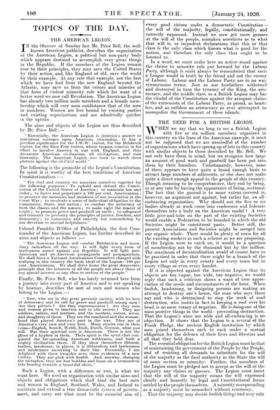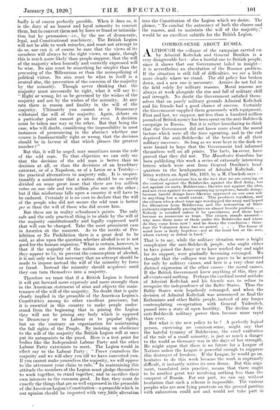THE NEED FOR A BRITISH LEGION.
WHEN we say that we long to see a British Legion with five or six million members organized in this country on the lines of the American example, it must not be supposed that we are unmindful of the number of organizations which have sprung up of late in this country with similar objects to those described by Mr. Bell. We not only have them in mind, but we recognize how large An amount of good work and goodwill has been put into them by their founders. Unfortunately, however, none of them appears to have quite a broad enough basis to attract large numbers of adherents, or else does not make quite a direct enough appeal to the people of this country. Though meaning to be comprehensive, they end by being, or at any rate by having the appearance of being, sectional. The fact that the ground is to some extent covered is,- however, an argument not against, but rather for, an all- embracing organization. Why should not the five or six bodies already at work come into conference and federate themselves into a body on the American model ? A very little give-and-take on the part of the existing Societies would enable a Federation to be founded in which the old Societies might be constituent parts. Better still, the present Associations and Societies might be merged into one organic whole. There would be plenty of room for all the existing workers in such a scheme as we are proposing. If the Legion were to catch on, it would be a question of membership not by the thousand but by the million. The maximum of decentralization would of course have to be practised in order that there might be a branch of the Legion not only in every county and every town. but in every village or even every hamlet. If it is objected against the American Legion that its objects are too vague, too wide, too negative, we would reply that such a criticism shows a want of true appre- ciation of the needs and circumstances of the hour. When foolish, 'headstiOng, or 'designing persons are making an attempt to destroy one's house, the man who says them nay and who is determined to stop the work of mad destruction, who insists in fact in keeping a roof over his head, is no mere votary of negation. He is doing one of the most positive things in the world—preventing destruction. That the Legion's aims are wide and all-embracing is no objection. It shows that the Legion is a revival of the Frank Pledge, the ancient English institution by which men joined themselves each to each under a mutual obligation for the defence of their lives and liberties and all that they held dear.
The essential obligation for the British Legion must be that of maintaining the government of the People by the People, and of resisting all demands to substitute for the will of the majority as the final authority in the State the will of some section or minority. Further, the members of the Legion must be pledged not to accept as the will of the majority any claims or guesses. The Legion must insist that the will of the majority means the will expressed clearly and honestly by legal and Constitutional forms settled by the people themselves. A minority masquerading as a majority must be unmasked without ceremony.
That the majority may decide foolish things and may rule badly is of course perfectly possible. When it does so, it is the duty of an honest and loyal minority to convert them, but to convert them not by force or fraud or intimida- tion but by persuasion—i.e., by the use of democratic, legal, and Constitutional machinery. The British Legion will not be able to work miracles, and must not attempt to do so, nor can it of course be sure that the views of its members Will always be the right views, or again, though this is much more likely than people suppose, that the will of the majority when honestly and correctly expressed will be wise. Its aim must be something far simpler than the procuring of the Millennium or than the monopolizing of political virtue. Its aim must be what in itself is a neutral aim, the prevention of the coercion of the majority by the minority. Though never thinking that the majority must necessarily be right, what it will say is : " Right or wrong, let us be governed by the wishes of the majority and not by the wishes of the minority. At any rate there is reason and finality in the will of the majority. Ultimately you cannot in a Democracy withstand the will of the majority. Again, debate on a particular point cannot go on for ever. A decision must be taken one way or the other. But that being the case, who will doubt, considering the impossibility in most instances of pronouncing in the abstract whether one course is fundamentally right or wrong, that the decision should be in favour of that which pleases the greatest number ? "
But this, it will be urged, may sometimes mean the rule of the odd man. To that objection we can only say that the decision of the odd man is better than no decision at all, or than the decisions of an hereditary autocrat, or of a Napoleon, or of a Lenin or a Trotsky— the practical alternatives to majority rule. It is unques- tionably a misfortune that a nation should be so nearly divided on some great issue that there are ten million votes on one side and ten million plus one on the other ; but if this misfortune falls upon a country it will have to be endured. Certainly it is no cure to declare that the will of the people who did not secure the odd man is better per se than the will of those who did secure him.
But these are in reality schoolmen's points. The only safe and the only practical thing is to abide by the will of the majority constitutionally and legally expressed until that will can be changed. Take the most prominent case in America at the moment. As to the merits of Pro- hibition or No Prohibition there is a great deal to be said, as also upon the question whether alcohol is or is not good for the human organism..What is certain, however, is that if the majority of the nation are determined, as they appear to le, to prevent the consumption of alcohol, it is not only wise but necessary that no attempt should be made to impose instead the will of the minority by force or fraud. Instead the minority should acquiesce until they can turn themselves into a majority.
Therefore we trust that if a British Legion is formed it will put forward more expressly and more strongly than in the American statement of aims and objects the main- tenance of the will of the majority. No doubt that is quite clearly implied in the preamble of the American Legion's Constitution among its other excellent provisoes, but it is essential in this country to make people under- stand from the beginning that in joining the Legion they will not be joining any body which is opposed to Democracy or to Labour or to popular rights, but on the contrary an organization for maintaining the full rights of the People. By insisting on obedience to the will of the majority the British Legion will at once put its antagonists to the proof. Here is a test point for bodies like the Independent Labour Party and the other Labour Party extremists to meet. The Legion would in effect say to the Labour Party : " Prove yourselves the majority and we will obey you till we have converted you. If you cannot make yourselves the majority, we will oppose to the uttermost your claim to rule." In maintaining this attitude the members of the Legion must pledge themselves to work together, to stand together, and to sacrifice their own interests to the common good. In fine, they must do exactly the things that are so well expressed in the preamble of the American Legion's Constitution—a preamble which in our opinion should be imported with very,little alteration into the Constitution of the Legion which we desire. The phrase, " To combat the autocracy of both the classes and the masses, and to maintain the will of, the majority," would be an excellent subtitle for the British Legion.



































 Previous page
Previous page